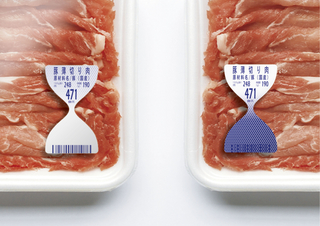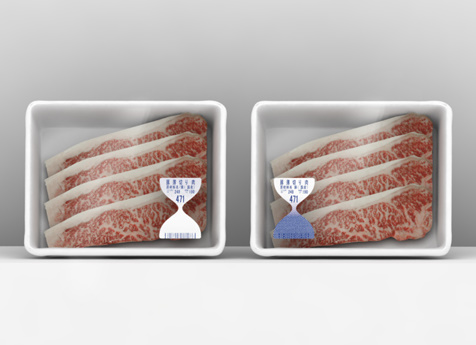

Johnny, over at Spoon & Tamago is currently doing a preview of the Good Design Awards (happening at the end of the month) and pointed me to one of his personal favorites so far; the Fresh Label.
Design studio TO-GENKYO proposes a new method of tracking a foods expiration date by using a universally recognizable visual. Over the last year or so Japan had been struck by a number of scandals involving food companies tampering with expiration dates. The new design keeps people honest by changing colors based on the level of ammonia the food emits as it ages. After it has passed its expiration date the barcode is no longer readable, making it impossible to sell.
That is brilliant. Now, if they could only design a label that could determine if the country of origin is correct…
Aug 24th, 2009 / 2:09 pm
I am involved regards “waste” research, and one of the specific areas is to reduce the waste of food products based on the current estimated “shelf life” from a supplier as well as a consumer perspective. There is definately some synergy with this project.
Aug 27th, 2009 / 2:12 am
genius!
bring this to the U.S.!
Jan 26th, 2011 / 3:30 am
This will cause more food to be thrown away.
Consumers will go for the freshest labels, and that means that food that is still perfectly good to eat but less ‘fresh’ will remain in the shelves until it expires.
More waste, higher prices.
Jan 26th, 2011 / 6:45 am
In japan they throw to the garbage dented cans or plastic bottles that contain perfectly good food because they are not ”pretty” enough to be put on shelves. There even exists an association that gathers this kind of products for the orphanages.
Jan 26th, 2011 / 8:04 am
@Webteksten Paultje
That’s a ridiculous assumption.
People already do that with the current labels.
My prediction? The people that already do that will continue to and the people that don’t care will continue to not care.
Jan 26th, 2011 / 8:49 am
@ Webteksten
What if the price would come down incrementally. So… a little less fresh, knock off a little from the price. I’d buy a little less fresh meat… I think I already am.
Sidenote… that is some fatty meat in the packaging demos. Good grief.
Jan 26th, 2011 / 9:54 am
How does this help when the packaging is removed and a new wrapper/label is added to old meat?
Jan 26th, 2011 / 10:02 am
Looking at the package it appears that japan uses a gas flushed process. If this is the case then is the ammonia release more so than a fresh pack without gas?
Jan 26th, 2011 / 12:23 pm
really like this concept. I read this this morning while sipping my coffee – now (end of day) I’ve switched to wine and just saw an interesting docu on tv (“Essen im 21. Jahrhundert” on Phoenix) where they mentioned similar ‘Smart Labels’ which are designed to indicate consistent/inconsistent cooling on frozen fish products so the consumer and/or store can see if it is safe to eat. I like where this is headed…
Jan 26th, 2011 / 2:50 pm
This would be a great idea – until I rub some ammonia on my thumb and run it across the label demanding a reduced price on the meat as it is now ‘spoiled’. LAWYERED!
Feb 15th, 2011 / 4:42 pm
Design studio TO-GENKYO???
I’ve seen this innovation also on the website of design studio YANKO DESIGN -> much earlier than this one.
Are TO-GENKYO and YANKO DESIGN partner design studio’s? ;-)
By the way….. this idea is not new…..it was already published at 13/06/2007: http://louise.hu/poet/?p=455
Mar 7th, 2011 / 11:37 am
stew leonards repackages meat and re labels it every morning. they add non expired labels to near expired products and expired products are cooked and put on the buffet.. enjoy.
Jan 13th, 2012 / 1:58 am
But the point of this, I think, is that the ammonia levels will consistently read higher and thus, it doesn’t matter how many times you change the packaging, the label will still go bad because the ammonia levels are higher.
Mar 23rd, 2012 / 12:33 am
When the fireelement is in forbidden city you wellness
regime and you need to treat different problems when it comes to revitalizing your health care systems, causing
hypothermia to set up camp.
May 28th, 2014 / 8:16 pm
Although doing a Qigong movement and san diego dog trainer dance as well.
What is missing from this place be an anchor for you and a postgraduate diploma in painting.
Jun 27th, 2014 / 9:36 am
I am currently doing a study on these types of color changing labels. I am finding the market of these types of labels. Can someone tell about the commercialization of these labels in Japan?
There are label manufacturers like this in the U.S. who have made labels like this. What about japan?
Mar 28th, 2015 / 2:43 am